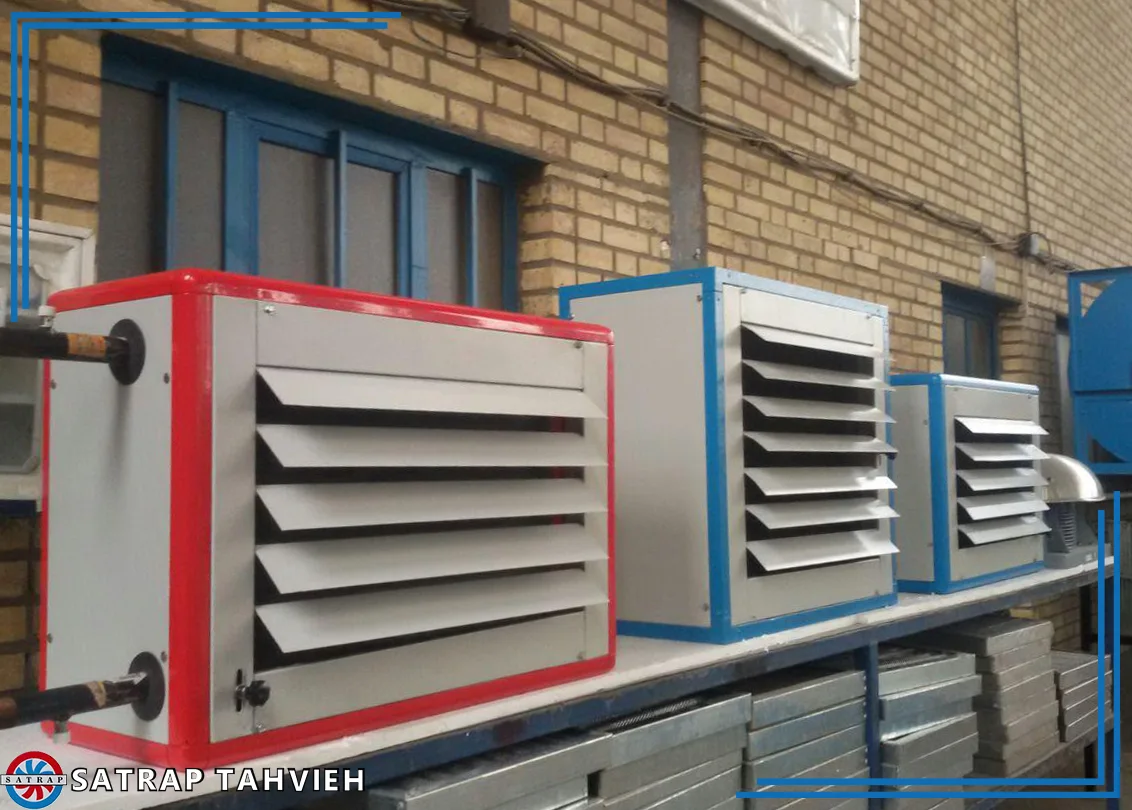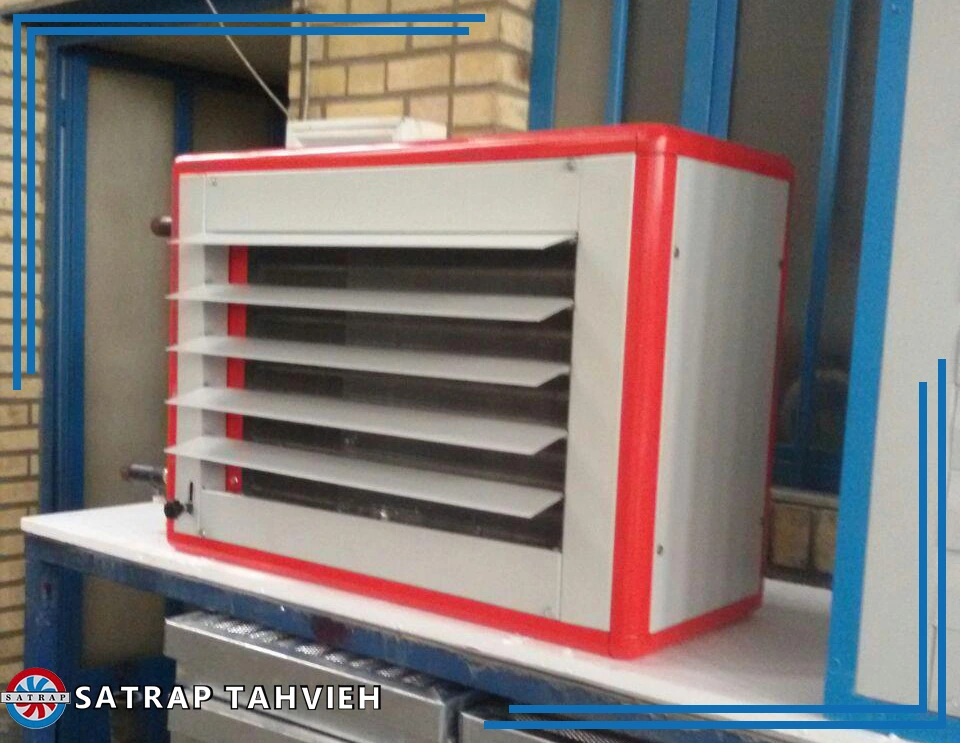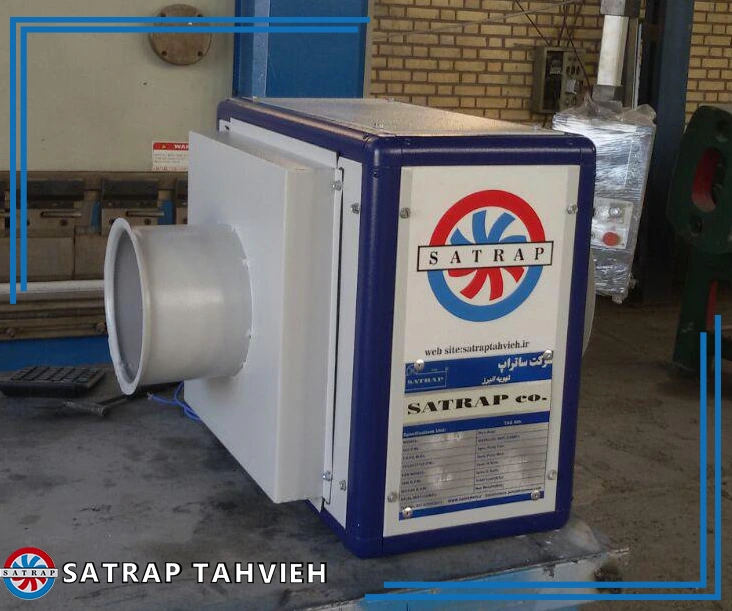Description
A unit heater is a device used to heat large spaces such as indoor halls, factory workshops, and warehouses. It consists of the following parts:
- Coil: The coil is a heat exchanger that transfers heat from hot water or steam to the air passing over it.
- Fan: The fan blows air over the coil, causing it to heat up.
- Casing: The unit heater casing is made of metal and protects the device from physical damage.
Unit heater installation
Unit heaters can be installed in various ways. Some models are suspended from the ceiling, while others are mounted on the wall or even placed on the ground. The heat generated by the heat exchanger is blown out by the fan, creating a flow of warm air in the space.
Advantages of unit heaters
Unit heaters are a popular choice for large spaces because they are easy to install, have relatively low installation and maintenance costs, and can heat a space quickly. They are also used for rapid heating due to their ability to produce significant heat in a short time.
Types of unit heaters
Unit heaters are classified based on the type of heating energy, installation location, airflow direction, and application.
Unit heater types based on heating energy
-
Hydronic unit heater: In this type of unit heater, hot water or steam is transferred from a central heating source such as a boiler or wall-mounted condensing boiler to the unit heater.
-
Electric unit heater: In this type of unit heater, heating is provided by electric heating elements.

Unit Heaters: Types, Applications, Advantages, and Disadvantages
Unit heaters are devices that are used to provide heat in large spaces. They are typically used in industrial, commercial, and residential settings. Unit heaters work by blowing heated air through a space, which helps to raise the temperature.
Types of Unit Heaters
Unit heaters can be classified based on their installation location, airflow direction, and application.
Based on Installation Location
- Ceiling-mounted unit heaters: These are installed on the ceiling and distribute heated air vertically or horizontally.
- Wall-mounted unit heaters: These are installed on the wall and distribute heated air horizontally.
Based on Airflow Direction
- Unit heaters with vertical airflow: These units distribute heated air vertically.
- Unit heaters with horizontal airflow: These units distribute heated air horizontally.
Based on Application
- Industrial unit heaters: These are designed for heating large industrial spaces such as factories, warehouses, and workshops.
- Commercial unit heaters: These are designed for heating commercial spaces such as stores, restaurants, and offices.
- Residential unit heaters: These are designed for heating residential spaces such as houses and apartments.
Advantages of Unit Heaters
- They can heat large spaces quickly and efficiently.
- They are relatively easy to install and maintain.
- They are relatively inexpensive to operate.
Disadvantages of Unit Heaters
- They can be noisy when operating.
- They can create drafts in the heated space.
- They can be inefficient if not properly sized and installed.
Here are some examples of unit heater applications:
- Heating sports halls: Unit heaters are used to heat sports halls such as football, basketball, volleyball halls, etc.
- Heating conference rooms: This device is used to heat conference rooms such as conference halls, theaters, etc.
- Heating industrial halls: Unit heaters are used to heat industrial halls such as production halls, warehouses, etc.
- Heating warehouses: This device is used to heat warehouses such as food warehouses, pharmaceutical warehouses, etc.

Factors to consider when choosing a unit heater
- Space size: The first factor to consider is the size of the space. The capacity of the unit heater must be proportional to the size of the space. If the unit heater does not have enough capacity, it will not be able to heat the space effectively.
- Type of use: The type of use is also an important factor in choosing a unit heater. Unit heaters are produced in different types for different applications. For example, industrial unit heaters are used for heating large industrial spaces such as factories and warehouses. Commercial unit heaters are used for heating commercial spaces such as shops and restaurants. And residential unit heaters are used for heating residential spaces such as houses and apartments.
- Budget: The price of unit heaters varies. Depending on the size, type, and capacity, the price of unit heaters can range from a few million Tomans to several hundred million Tomans.
- Thermal efficiency: The thermal efficiency of unit heaters is also an important factor. Thermal efficiency indicates how much of the energy consumed by the unit heater is converted into space heating. Unit heaters with higher thermal efficiency are more efficient and consume less energy.
Other factors:
- Noise level: Unit heaters can be noisy, especially when they are running at full capacity. If noise is a concern, you may want to choose a unit heater with a low noise level.
- Safety features: Unit heaters should have safety features such as overheat protection and a fan guard.
- Warranty: Unit heaters should come with a warranty that covers repairs or replacement in case of defects.
Hot Water and Steam Unit Heaters
Unit heaters are classified into two categories based on the type of heating energy they use: hot water unit heaters and steam unit heaters.
Hot Water Unit Heaters
In a hot water unit heater, hot water or steam is transferred from a central heat source, such as a boiler or wall-mounted unit, to the unit heater. The hot water or steam passes through the unit heater’s coil and heats the air. The air is then distributed into the environment by the unit heater’s fan.
Steam Unit Heaters
In a steam unit heater, steam is transferred from a central heat source, such as a boiler, to the unit heater. The steam passes through the unit heater’s coil and heats the air. The air is then distributed into the environment by the unit heater’s fan.
Differences Between Hot Water and Steam Unit Heaters
The main differences between hot water and steam unit heaters are:
Type of heating energy: Hot water unit heaters use hot water or steam. Steam unit heaters only use steam.
Thermal efficiency: The thermal efficiency of hot water unit heaters is higher than that of steam unit heaters.
Cost: The initial cost of steam unit heaters is lower than that of hot water unit heaters.
Risks: Steam unit heaters pose more risks than hot water unit heaters.
Choosing Between Hot Water and Steam Unit Heaters
To choose between a hot water or steam unit heater, factors such as application type, cost, and safety must be considered.
Application type: Hot water unit heaters are more commonly used for industrial and commercial applications. Steam unit heaters are more commonly used for residential and smaller commercial applications.
Cost: Hot water unit heaters have a higher initial cost than steam unit heaters. However, the maintenance cost of hot water unit heaters is lower than that of steam unit heaters.
Safety: Steam unit heaters pose more risks than hot water unit heaters. This is because steam can cause burns.

Here are some tips for choosing a hot water or hot steam unit heater :
User Type: Consider the type of user. If you need heating for large industrial or commercial applications, a hot water heater unit is a better option. If you need heating for residential or smaller commercial applications, a hot steam heater unit is a better option.
Cost: Consider initial and maintenance costs. A hot water heater unit has a higher initial cost, but lower maintenance costs.
Safety: Consider safety. Hot steam heater unit has more risks than hot water heater unit.
Buying a unit heater from Satraptahvieh
Satraptahvieh is a leading company in the field of designing and manufacturing air conditioning equipment in Iran. This company offers a wide range of unit heaters with high quality and reasonable prices. To buy unit heaters from Satrap Alborz Ventilation, you can visit this company’s website or contact their sales representatives. After choosing the product you want, you can order it online or by phone.


Reviews
There are no reviews yet.